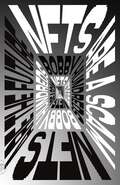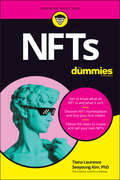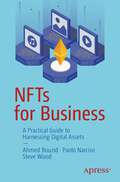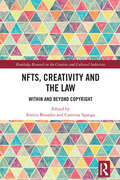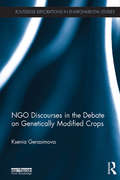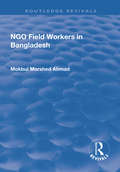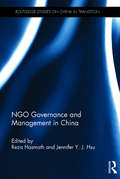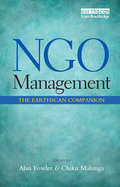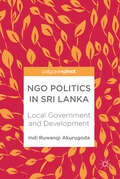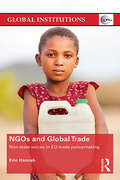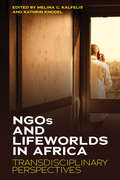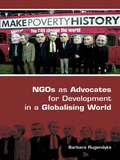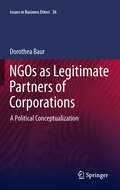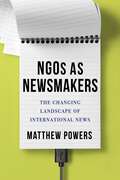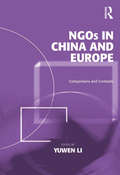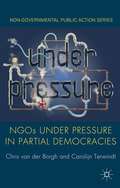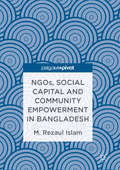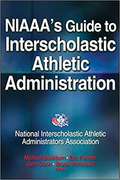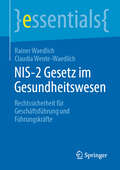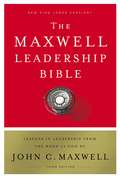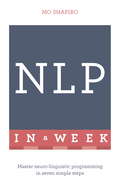- Table View
- List View
NFL UK
by Elie Ofek David B. Godes Peter WickershamThe NFL faces a decision on how to continue efforts to grow its fanbase in the UK. The decision needs to take into account lessons learned from previous NFL activities in Europe, market research on the UK sports fan and the implications of any move on the U.S. fan. Moreover, the decision should be couched within the broader context of the NFL's goal to expand internationally. Alistair Kirkwood, head of NFL UK, and Chris Parsons, VP of NFL International, must propose a course of action that the London-based team can both execute and that will receive the approval of the NFL's commissioner and owners.
NFTs Are a Scam / NFTs Are the Future: The Early Years: 2020-2023
by Bobby HundredsThe nationally bestselling author and streetwear entrepreneur Bobby Hundreds’s manifesto about NFTs, the future of creativity, and bringing his brand and community into the modern digital space.Bobby Hundreds has spent twenty years building his streetwear company, The Hundreds, to be as much a community as a brand. So when Bobby discovered NFTs in 2020, he knew that the technology had the makings of a revolution. Now fans could not only directly support artists and creators but also have a genuine stake in the success of the work. Here, Bobby saw a way for the Hundreds community to participate in the brand as never before. But was this a good idea? Are NFTs truly the future of creativity? Or just a fad? Are they a scam? Maybe they are all those things. In NFTs Are a Scam / NFTs Are the Future, Bobby digs deep into these questions and more: Are NFTs fashion? A cult? Already over? Just beginning? None of the answers are simple, and Bobby works through each with the thoughtfulness and hard-earned insight that have made him a fervently sought-after voice in conversations about creativity, commerce, and community in the digital age. Over the course of just a few years, NFTs have been celebrated and derided; fortunes have been made and lost, empires built and toppled, and Bobby has been, and remains, in the thick of it. For the reader sitting on a collection of NFTs, this is an obvious must-read. For those wondering what’s been going on—and why it’s worth paying attention to—it is the perfect primer.
NFTs For Dummies
by Tiana Laurence Seoyoung KimGet a grip on NFTs and learn how to get in the game It’s not often that a brand-new investment comes along that revolutionizes how we buy and sell digital assets. But that’s what non-fungible tokens (NFTs) did. Built on blockchain tech, NFTs are shaking up the world of digital commodity investing. And you can get your slice of the pie before everyone jumps into the arena. In NFTs For Dummies, you’ll find straightforward answers to critical aspects of the NFT phenomenon. You’ll learn exactly what non-fungible tokens really are, how you can find them, and even how to create your own valuable NFTs. You’ll also discover: How to find reliable and safe NFT marketplaces where you can be sure you’re dealing with reputable buyers and sellers A peek behind the NFT curtain to see how NFTs work and what, exactly, you own when you buy or make an NFT Discussions of the kinds of digital properties that can be converted into an NFT Perfect for anyone who wants to learn about the market for buying, selling, and creating crypto collectibles, NFTs For Dummies is the only resource you’ll need to get a handle on this cutting-edge tech and start making it work for you.
NFTs for Business: A Practical Guide to Harnessing Digital Assets
by Steve Wood Ahmed Bouzid Paolo NarcisoMove beyond the tech jargon and the hype of non-fungible tokens (NFT)s and become empowered to think through solutions to solve your specific business problems. NFTs are important because they enable the manipulation of digital assets in ways that are closer to the way we manipulate physical assets. This book will serve as an introduction to the space and as a source of inspiration for connecting problem and solution dots. Understanding what core problems NFTs solve and how they solve them will enable business leaders to design solutions and to put together the teams that will help them deliver on the promises of NFTs. This book is focused on explaining what NFTs are, what problems they solve, and what what technology makes them possible. It provides the larger technological, economic, and political context within which NFTs are emerging. You'll learn how NFTs are currently being used, such as in assessing authenticity, creating scarcity, identifying provenance, establishing and confirming ownership, and enabling the tracking and collection of royalties You'll also see how NFTs allow for the creation of unique digital assets that can be owned and traded just like physical assets. NFTs is your guide to the emerging possibilities of ownership and monetization of digital assets in established industries.What You'll LearnSee what problems NFTs can solveStudy the fundamentals of blockchain technologyUnderstand what “Web3” means and the possibilities ahead Identify problems that NFTs can solve Deliver NFT and blockchain based solutionsWho This Book Is ForEntrepreneurs, executives, and product line managers in the following industries: Art, Music, Podcasting, Gaming, Finance, and Real Estate. Additional audiences include Retail, Fashion, Entertainment, Event Management and Supply Chain Management.
NFTs, Creativity and the Law: Within and Beyond Copyright (Routledge Research in the Creative and Cultural Industries)
by Enrico Bonadio Caterina SgangaNon-Fungible Tokens (NFTs) have emerged as an important medium for the creation, sale and collection of art, with many major business and fashion houses creating their own NFT projects. This book investigates the eruption of NFT crypto art, and its impact on copyright law.Chapters address topics at the intersection between AI, smart contracts, data science, copyright law and arts administration. With snapshots of the ongoing heated debates around copyright law, the book investigates whether NFTs violate copyright and moral rights, the liability of NFTs platforms, impacts on ethical issues such as counterfeiting. The first book published on this emergent topic, this book offers a comprehensive overview of opportunities and challenges raised by NFTs to copyright law and, more generally, to the regulation and economics of the creative and cultural industries.The book is addressed to law and tech enthusiasts as well as academics, students, practitioners and policy makers interested in the intersection between copyright rules and new forms of technology.
NFX Capital and Moov Technologies
by Scott Duke Kominers Nicole Tempest KellerIn July 2019, James Currier, a general partner at San Francisco-based NFX Ventures, was considering a seed stage investment of $1.5 million in Moov Technologies, a B2B marketplace for used industrial equipment. NFX was a venture capital firm focused on seed-stage investments in technology businesses that utilized one or more of 15 network effects that NFX identified, viewing such businesses as having asymmetric upside potential. Currier saw growing potential in B2B marketplaces, which had taken a backseat to B2C marketplaces in the early 2000s. But market dynamics were changing as Milennials took the reins in legacy industries and looked for ways to bring the ease and speed of B2C marketplaces they were accustomed to in their personal lives to the workplace. NFX had already invested in one B2B marketplace and was now considering Moov, which operated in the pre-owned semiconductor manufacturing equipment market - estimated to have a market size of $8 to $10 billion. The business model was predicated on the fact that large manufacturers like Intel typically bought manufacturing equipment that had a 15-30 year useful life, but only used it for 3-5 years before swapping it out for newer models. The used equipment then either sat idle while it depreciated or was sold to other manufacturers through brokers. Steven Zhou, Moov's founder and CEO, had worked as a broker in the semiconductor equipment industry for 6 years; he used that experience to launch Moov in 2017 to digitize the equipment resale process through an online marketplace. As a seed stage investor, Currier knew he had to rely heavily on his assessment of the team, the product, and the sector. Currier acknowledged that Zhou was relatively inexperienced and would need mentorship. Yet Currier was impressed by Zhou's work ethic and "hustle." He was also encouraged by the fintech growth potential for Moov, including adding services such as insurance, shipping, and vendor financing.
NGO Discourses in the Debate on Genetically Modified Crops (Routledge Explorations in Environmental Studies)
by Ksenia GerasimovaThe development and use of genetically modified organisms (GMOs) has been a contentious topic for the last three decades. While there have been a number of social science analyses of the issues, this is the first book to assess the role of Non-Governmental Organizations (NGOs) in the debate at such a wide geographic scale.The various positions, for and against GMOs, particularly with regard to transgenic crops, articulated by NGOs in the debate are dissected, classified and juxtaposed to corresponding campaigns. These are discussed in the context of key conceptual paradigms, including nature fundamentalism and the organic movement, post-colonialism, food sovereignty, anti-globalisation, sustainability and feminism. The book also analyses how NGOs interpret the debate and the persuasive communication tactics they use. This provides greater understanding of the complexity of negotiations in the debate and explains its specific features such as its global scope and difficulty in finding compromises. The author assesses the long-term interests of various participants and changes in perceptions of science and in public communication as a result. Examples of major NGOs such as Greenpeace, Oxfam and WWF are included, but the author also provides new research into the role of NGOs in Russia.
NGO Field Workers in Bangladesh
by Mokbul Morshed AhmadThis title was first published in 2002. NGOs are receiving increasing international attention and resources from policy makers, donors, academics and others. The New Policy Agenda accepts NGOs as agents for social welfare alongside the state and as fostering democracy in the Developing World. Astonishingly, however, there have been very few studies and no books on NGO field workers. This study of field workers in Bangladesh, provides excellent insights into this neglected field. Bangladesh is an excellent example as, since independence in 1971, it has been a 'donor-dependent' country, both financially and functionally, and since the 1980s has concentrated this funding towards NGOs rather than to the state. The book shows how field workers are seen simply as implementers, carrying out directions given by their superiors and never being consulted on how best to achieve their goals. The book examines four types of NGOs - international, national, regional and small/local - in a number of sample locations. It compares the benefits and facilities provided by each NGO to their field workers, then explores the socio-economic background of both field workers and their mid-level managers and examines the interactions between these two groups and between field workers and their clients. It also looks at the field workers’ personal and professional lives and problems and details their opinions on their NGO’s activities and policies and on development . The findings show that NGO managers and donors lack knowledge of the realities in the field and do not realise how certain policies, such as their positive discrimination of women, can have negative results. It proposes that NGO field workers should be more active in policy making and puts forward several recommendations for changes in the management and structure of future NGOs.
NGO Governance and Management in China (Routledge Studies on China in Transition)
by Reza Hasmath Jennifer Y. HsuAs China becomes increasingly integrated into the global system there will be continuing pressure to acknowledge and engage with non-governmental organizations (NGOs). Suffice to say, without a clear understanding of the state’s interaction with NGOs, and vice versa, any political, economic and social analysis of China will be incomplete. This book provides an urgent insight into contemporary state-NGO relations. It brings together the most recent research covering three broad themes, namely the conceptualizations and subsequent functions of NGOs; state-NGO engagement; and NGOs as a mediator between state and society in contemporary China. The book provides a future glimpse into the challenges of state-NGO interactions in China's rapidly developing regions, which will aid NGOs strategic planning in both the short- and long-term. In addition, it allows a measure of predictability in our assessment of Chinese NGOs behaviour, notably when they eventually move their areas of operation from the domestic sphere to an international one. The salient themes, concepts, theories and practice discussed in this book will be of acute interest to students, scholars and practitioners in development studies, public administration, and Chinese and Asian politics. Reza Hasmath is a Lecturer in Chinese Politics at the University of Oxford, UK, and an Associate Professor in Political Science at the University of Alberta, Canada. His research looks at state-society relationships, the labour market experiences of ethnic minorities, and development theories and practices. Jennifer Y.J. Hsu is an Assistant Professor in Political Science at the University of Alberta, Canada. Her recent publications include a co-authored book HIV/AIDS in China: The Economic and Social Determinants (Routledge, 2011), and a co-edited book The Chinese Corporatist State: Adaption, Survival and Resistance (Routledge, 2012).
NGO Management: The Earthscan Companion (Earthscan Reader Ser.)
by Alan Fowler; Chiku MalungaThe task environment of NGOs is changing rapidly and significantly, making new demands on their management and leadership. This Companion discusses the complexities involved. It illustrates how NGOs can maintain performance and remain agile amidst increasing uncertainties. These factors include the position of NGOs in civil society, their involvement in governance and coping with the effects of the securitisation of international aid. Complementing The Earthscan Reader in NGO Management, selected contributions and specially commissioned pieces from NGO thought-leaders and practitioners, provide the reader with insights on the emerging thinking, competences and practices needed for success in managing and leading tomorrow's NGOs.
NGO Politics in Sri Lanka
by Indi Ruwangi AkurugodaThis book examines how and why local communities have been neglected in development initiatives in South Asia, focusing on Sri Lanka, and assesses the significant support from NGOs in increasing the capacity of local government and in promoting local development. Based on research in the southern and eastern provinces of Sri Lanka, this project analyses the views of national, provincial and local level political representatives, administrative officials, and NGO officials.
NGOs and Global Trade: Non-state voices in EU trade policymaking (Global Institutions)
by Erin HannahIn a deeply iniquitous world, where the gains from trade are distributed unevenly and where trade rules often militate against progressive social values, human health, and sustainable development, NGOs are widely touted as our best hope for redressing these conditions. As a critical voice of the poor and marginalized, many are engaged in a global struggle for democratic norms and social justice. Yet the potential for NGOs to bring about meaningful change is limited. This book examines whether improvements in participatory opportunities for progressive NGOs results in substantive and normative policy change in one of the major trading powers, the European Union. Hannah advances a constructivist account of the role of NGOs in the EU’s trade policymaking process. She argues that NGOs have been instrumental in providing education, raising awareness, and giving a voice to broader societal concerns about proposed trade deals, both when they take advantage of formal participatory opportunities and when they protest from the streets and in the media. However, the book also highlights how NGO inputs are mediated by the social structure of global trade governance. Epistemes—the background knowledge, ideological and normative beliefs, and shared assumptions about how the world works—determine who has a voice in global trade governance. Showing how NGOs succeed only when their advocacy conforms broadly to the dominant episteme, this book will be of value to scholars and students with an interest in NGOs and international trade negotiations. It will also be of interest to policymakers, national trade negotiators, government departments, and the trade policy community.
NGOs and Lifeworlds in Africa: Transdisciplinary Perspectives
by Melina C. Kalfelis Kathrin KnodelNon-governmental organizations (NGOs) have become ubiquitous in the development sector in Africa and attracting more academic attention. However, the fact that NGOs are an integral part of the everyday lives of men and women on the continent has been overlooked thus far. In Africa, NGOs are not remote, but familiar players, situated in the midst of cities and communities. By taking a radical empirical stance, this book studies NGOs as a vital part of the lifeworlds of Africans. Its contributions are immersed in the pasts, presents and futures of personal encounters, memories, decision-making and politics.
NGOs as Advocates for Development in a Globalising World
by Barbara RugendykeThis book traces the recent growth in NGO advocacy. Barbara Rugendyke presents empirical findings about the impacts of NGO advocacy activity on the policies and practices of global and regional institutions. The research reveals the mixed successes of advocacy as a strategy for addressing the ongoing causes of poverty in developing nations. Case studies illustrate the advocacy work of Australian NGOs, of British NGOs policies about engaging with multinationals, of Oxfam International’s advocacy directed at World Bank policies and NGO advocacy in the Mekong Region. Adopting an interdisciplinary approach, the mixed successes of advocacy as a strategy used by NGOs in attempting to address the ongoing causes of poverty in developing nations are examined. This volume is a useful aid to researchers, students and lecturers and to development practitioners interested in advocacy as a development strategy.
NGOs as Legitimate Partners of Corporations
by Dorothea BaurThe interaction between corporations and non-governmental organizations (NGOs) has become an important topic in the debate about corporate social responsibility (CSR). Yet, unlike the vast majority of academic work on this topic, this book explicitly focuses on clarifying the role of NGOs, not of corporations, in this context. Based on the notion of NGOs as political actors it argues that NGOs suffer from a multiple legitimacy deficit: they are representatives of civil society without being elected; the legitimacy of the claims they raise is often controversial; and there are often doubts regarding the legitimacy of the behaviour they exhibit in putting forward their claims. Set against an extended sphere of political action in the postnational constellation this book argues that the political model of deliberative democracy provides a meaningful conceptualization of NGOs as legitimate partners of corporations and it develops a conceptual framework that specifically allows distinguishing legitimate partner NGOs from two related actor types with whom they share certain characteristics but who differ with respect to their legitimacy. These related actor types are interest groups on the one hand and activists on the other hand. In conclusion it argues that a focus on the behaviour of NGOs is most meaningful for distinguishing them from interest groups and activists.
NGOs as Newsmakers: The Changing Landscape of International News (Reuters Institute Global Journalism Series)
by Matthew PowersAs traditional news outlets’ international coverage has waned, several prominent nongovernmental organizations have taken on a growing number of seemingly journalistic functions. Groups such as Amnesty International, Human Rights Watch, and Médecins Sans Frontières send reporters to gather information and provide analysis and assign photographers and videographers to boost the visibility of their work. Digital technologies and social media have increased the potential for NGOs to communicate directly with the public, bypassing traditional gatekeepers. But have these efforts changed and expanded traditional news practices and coverage—and are there consequences to blurring the lines between reporting and advocacy?In NGOs as Newsmakers, Matthew Powers analyzes the growing role NGOs play in shaping—and sometimes directly producing—international news. Drawing on interviews, observations, and content analysis, he charts the dramatic growth in NGO news-making efforts, examines whether these efforts increase the organizations' chances of garnering news coverage, and analyzes the effects of digital technologies on publicity strategies. Although the contemporary media environment offers NGOs greater opportunities to shape the news, Powers finds, it also subjects them to news-media norms. While advocacy groups can and do provide coverage of otherwise ignored places and topics, they are still dependent on traditional media and political elites and influenced by the expectations of donors, officials, journalists, and NGOs themselves. Through an unprecedented glimpse into NGOs’ newsmaking efforts, Powers portrays the possibilities and limits of NGOs as newsmakers amid the transformations of international news, with important implications for the intersections of journalism and advocacy.
NGOs in China and Europe: Comparisons and Contrasts
by Yuwen LiThis volume presents a comparison of the experiences of NGOs in China and Europe. The chapters on China contain the most comprehensive and up-to-date analysis of various types of NGOs currently active in the country. The contributions on foreign NGOs in China, non-governmental think tanks, public interest legal organizations, labour related NGOs and charity organizations, are the first in English to discuss successful experiences as well as the difficulties they face in the post-Mao era. The European studies draw examples from countries where the experiences of NGOs are at various stages of development. The section on NGOs in Central and Eastern Europe examines the rapid expansion of civil society and their pivotal role in promoting political change and building democracy in a transitional society, as well as the challenges they confront in advancing a strong civil society. Those chapters on NGOs' experiences in Western European countries, especially in the Netherlands and the UK, provide insightful information and examination of the most contentious issues concerning NGOs' accountability, governance and relationship with the government.
NGOs under Pressure in Partial Democracies
by Chris van der Borgh Carolijn TerwindtOver the past decade, international human rights organizations and think tanks have expressed a growing concern that the space of civil society organizations around the world is under pressure. This book examines the pressures experienced by NGOs in four partial democracies: Guatemala, Honduras, Indonesia and the Philippines. Based on fieldwork, it analyzes the complex processes of shrinking political space and the ways NGOs and grassroots organizations try to defend and reclaim their space.
NGOs, Political Protest, and Civil Society
by Carew BouldingThis book argues that non-governmental organizations (NGOs) have an important effect on political participation in the developing world. Contrary to popular belief, they promote moderate political participation through formal mechanisms such as voting only in democracies where institutions are working well. This is a radical departure from the bulk of the literature on civil society that sees NGOs and other associations as playing a role in strengthening democracy wherever they operate. Instead, Carew Boulding shows that where democratic institutions are weak, NGOs encourage much more contentious political participation, including demonstrations, riots, and protests. Except in extreme cases of poorly functioning democratic institutions, however, the political protest that results from NGO activity is not generally anti-system or incompatible with democracy again, as long as democracy is functioning above a minimal level. "
NGOs, Social Capital and Community Empowerment in Bangladesh
by M. Rezaul IslamThis pivot examines non-governmental organization (NGO) interventions in two community development initiatives, namely social capital and community empowerment, and their role in funding and formulating development frameworks in developing countries like Bangladesh. It considers the key development discourse issues of collective action, social trust and access to knowledge, to political processes and to financial, social and natural resources. Given the large proportion of foreign funding, NGOs and donors also increasingly face the twin challenges of demonstrating both efficient and effective delivery of services and accountability in their relationships with various stakeholders. Reflecting on the relevance of NGOs for community development, and the merits, challenges and limitations of NGO activities, this book provides a comprehensive study of NGO participation in community development in Bangladesh and Third World countries more widely to highlight a global concern with international implications.
NIAAA's Guide To Interscholastic Athletic Administration
by National Interscholastic Athletic Administrators AssociationNIAAA’s Guide to Interscholastic Athletic Administration presents a wealth of information and insights from experienced athletic directors across the United States. This comprehensive resource covers leadership, operations, financial and facilities management, and other chief administrative responsibilities to help readers better understand the athletic director’s multifaceted role. NIAAA’s Guide to Interscholastic Athletic Administration was developed under the direction of the National Interscholastic Athletic Administrators Association (NIAAA), the trusted authority for excellence in administration of high school sports. This guidebook features the best practices in high school athletic administration to assist both aspiring and practicing athletic directors in meeting the demands of the job. General guidelines and background knowledge are complemented by specific strategies and techniques. Each chapter offers examples of how to solve common problems, and sidebars highlight creative solutions employed by exemplary high school athletic directors. This text features guidance and multidisciplinary information on handling some of the toughest parts of the job. A chapter on personnel management discusses mentoring and evaluation systems to assist with the growth and development of staff, and a technology chapter offers specific recommendations of tools to help athletic directors operate more effectively and efficiently. A chapter on legal and safety concerns outlines concrete measures that administrators can take to prevent mishaps and protect their schools and staff from liability. Readers will also learn how to manage a budget and find creative alternatives to get the most out of available funds. Based on extensive research conducted by the editors, this text confronts several challenges facing contemporary high school sport administrators: • Providing comprehensive professional preparation for athletic director candidates and continuing education for today’s athletic directors • Aligning the goals of education-based athletic programs and the conduct of coaches, athletes, and parents engaged in the program to the educational mission of the school, district, state, and national governing organizations • Ensuring ongoing education in vital areas including student citizenship, staff support, safety, risk management, and budget preparation • Making consistent efforts to provide equitable opportunities for participation and accommodate the abilities and interests of all student-athletes The position of interscholastic athletic administrator is rapidly becoming one of the most challenging positions in any school as these professionals are asked to do more with less. Given proper education, tools, and goals, NIAAA recognizes the pivotal role an athletic administrator can have in enriching the school culture and experiences of participating athletes, parents, and coaches. NIAAA’s Guide to Interscholastic Athletic Administration provides fundamental knowledge guided by sound educational practices to enable athletic administrators to execute their daily duties with competence and confidence.
NIOS Book Code-319 Higher Secondary Course-Books 1 and 2 of Commerce -Business Studies
by National Institute Of Open SchoolingThis book covers the following important modules under Commerce for NIOS Senior Secondary Course: Business Around Us, Business Organizations, Business Management, Business Finance,Marketing etc.
NIS-2 Gesetz im Gesundheitswesen: Rechtssicherheit für Geschäftsführung und Führungskräfte (essentials)
by Rainer Waedlich Claudia Wente-WaedlichDie ausufernde Bürokratisierung überfordert Ärzte und Gesundheitsmanager in der ambulanten und stationären Versorgung durch immer höhere Verpflichtungen und Risiken. Die neue EU-Gesetzgebung mit dem NIS-2 Umsetzungsgesetz für konsequente Informationssicherheit und hohe persönliche Risiken für Führungskräfte stellt einen Paradigmenwechsel im Gesundheitswesen dar. Das Buch bietet Hilfe zur Selbsthilfe für alle, die Verantwortung in Krankenhäusern, Kliniken, Praxen sowie Pflegeeinrichtungen tragen. Ärzte können mit dem Wissen, das durch das Buch vermittelt wird, wieder ihre eigene Organisation beherrschen.
NKJV, Maxwell Leadership Bible, Third Edition, Ebook
by John C. MaxwellEvery believer is a person of influence. In the Maxwell Leadership Bible, leadership expert John C. Maxwell shows you the principles of leadership taught in God’s Word and how to use them. Whether you are an employee, a boss, a parent, or a neighbor, you are a person of influence in your part of the world. Throughout the pages of Scripture, John Maxwell has assembled the time-tested and irrefutable biblical principles of leadership to equip and encourage leaders with his signature approach, including the 21 Laws of Leadership, the 21 Qualities of a Leader, biographical profiles, and hundreds of notes.Features include:Now available in Thomas Nelson’s NKJV Comfort Print® typefaceOver 120 “Profiles in Leadership” lessons drawn from the people of the BibleHundreds of compelling short articles and notes on mentoring and influenceA complete reference index to the 21 Laws of Leadership and the 21 Qualities of a LeaderEasy-to-read 9-point print size
NLP In A Week: Master Neuro-Linguistic Programming In Seven Simple Steps
by Mo ShapiroNLP just got easier NLP in a Week provides a dynamic collection of tools, techniques and strategies that can facilitate excellence in all aspects of your life. This book will help you communicate more effectively and develop your interactions by studying: - the way you access and disseminate information through the language you use - your perceptions and the values you hold It will also offer you the opportunity to consider the different ways people filter information, thereby enabling you to create greater rapport by using their preferred filters and experiencing the world from their perspective. You will be able to increase your understanding of others by utilizing NLP's precision questions for clarification and thereby extending your 'map of the world'. NLP is based on the idea that mind, body and language interact to create our individual perception of what happens around us and that these perceptions, and their accompanying behaviours, can be changed. Developers of NLP believe that happiness and success are the result of specific patterns of thinking that can be learned by anyone. The psychiatrist R. D. Laing said: 'Change your body, change your mind. Change your mind, change your body.' When your mind is working with you and is on your side then your body will follow. You can use NLP to make changes whenever you feel stuck, and your new 'position' will enable new action. Your mind is your internal powerhouse that steers your thoughts and subsequent actions. The messages and thoughts from your mind have a significant influence on the way you feel and the actions you take. What is in your mind affects your health and wellbeing. What you think is what you get. NLP helps you increase the messages that are 'good' for you and diminish those that aren't. By the end of the week you will be able to use NLP at work and in your personal life in a way that will sharpen your skills and boost your achievements. - Sunday: What is NLP? - Monday: Identify empowering and limiting beliefs - Tuesday: Recognize how we re-present information to ourselves - Wednesday: Use precision questions to find out what people mean - Thursday: Identify different communication filters - Friday: Use the six levels of change and reframing - Saturday: Increase your options

